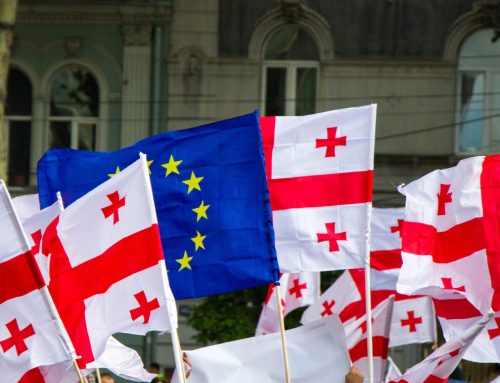For years, Alexander Lukashenko has been a problem frequently discussed but easily forgotten. When Belarus forced Ryanair flight FR4978 to land in Minsk and arrested Raman Pratasevich and Sofia Sapega, it took away the freedom and security not only of these two EU residents, but of all the passengers on that flight and posed a threat to journalism and dissent everywhere. Europe could no longer ignore the problem of the dictator in the middle of the continent.
The EU Council put out a strong response to what EU leaders have called a hijacking: a demand for the release of Pratasevich and Sapega as well as calls for harder measures against Belarus including new sanctions, the avoidance of Belarusian airspace by European airlines, and bans on Belarusian airlines using EU airspace and airports.
These serious steps are a good start. But this case of interference in the safe passage of a commercial airliner goes beyond the question of Belarus. It goes back to Russia.
Alexander Lukashenko’s regime is protected and emboldened by Russia. Belarus’s conflict with the democratic West serves the Kremlin’s interest. Belarus has high strategic value for Russia, and Belarus is deeply dependent on Russia’s economic support; the two countries’ militaries cooperate and form a bulwark on NATO’s eastern border, Russian fossil fuels supply Belarus and support its refining and fertilizer sectors, and in the aftermath of last year’s fraudulent election, Russia provided a massive loan to support Lukashenko in the post-election period, the second tranche of which was approved in the week after the forced landing of the Ryanair flight.
Notably, Russia provides information cover for Lukashenko and other cronies in the region. Russian state-backed media has made an industry of creating alternative narratives about MH17, a passenger plane shot down by Russian-backed separatists over eastern Ukraine in 2014. With the Ryanair flight, Russian state-backed media are following a similar path. The editor of Russian state-controlled media outlet RT, Margarita Simonyan, tweeted that she envied Belarus and that Lukashenko had pulled off the incident “beautifully.” RT coverage is already deflecting blame to Western governments and maligning Pratasevich as a militant fighter in Ukraine and as a neo-Nazi
Although Lukashenko has derided Russian interference in the past, including in the lead up to last year’s election, Russia’s financial and media backing against democratic protests in Belarus are essential for Lukashenko’s survival. Russian state-media opposition to the protests has been strong over the past year. As tracked by ASD’s Hamilton 2.0 Dashboard, common narratives pushed by Sputnik and RT include blaming external forces for organizing the pro-democracy protests and undermining their legitimacy; echoing Lukashenko’s claims to want to protect children from the protests; arguing that even the opposition supports Russia; and arguing that turning away from Russia’s support would bring Belarusians great hardship.
Europe needs to be better at holding Russia to account. Even though the EU Council was tough on Belarus, it was notably weak on Russia. The EU Council conclusions only expressed verbal solidarity with the Czech Republic and deferred the question of taking any counter measures against Russia for GRU agents blowing up a Czech munitions facility in 2014—another egregious incident. Russia’s direct violations of Europe’s security and support for regimes that undermine the safety of EU citizens should be at the top of the EU Council’s priorities and not pushed back any longer.
What’s Next?
Belarus, Russia, and other autocrats in the region have continued to boldly defy international human rights and security norms. The only way to prevent future transgressions is to show that there are real costs to these actions. Denunciations and minor sanctions will not be enough.
The EU Council called for investigations into the forced diversion of Ryanair flight 4978. It is imperative that investigations also cover the possible involvement of Russia and its security services in this incident, from operational to political and informational support. If any connection is found, the EU should take tough measures against Russia as well.
Formal investigations are only one part of the equation. The fight over clarity and consequences for Sunday’s state hijacking will take place largely in the information domain. European media and public officials should preempt and correct emerging Russian-backed narratives discounting the significance of the forced diversion of the plane, potential harm to the passengers, violation of norms, and integrity of Pratasevich, Sapega, and dissidents now imprisoned in Belarus.
The EU and European countries should also evaluate whether they should allow Russian state media unfettered access to EU audiences when Russia denies European-based media access to Russian audiences. Russia recently labelled the Latvia-based, independent news outlet Meduza a “foreign agent,” which will cut off the outlet from its advertising revenue in Russia and make it very difficult for its journalists to speak to official sources in Russia. Similarly, Russia is seeking to push the Prague-based U.S. broadcaster Radio Free Europe/Radio Liberty out of Russia, most recently freezing the news outlet’s bank accounts in Russia. The outlet was named a “foreign agent” in 2017.
The strength of the sanctions imposed against Belarus is incredibly important, especially given Alexander Lukashenko’s ongoing aggressive stance against Europe. As economic sanctions are considered, it is important for the EU to keep in mind the role Russia plays in enabling the Lukashenko regime, and to potentially target sectors that are most connected to this relationship. Belarus benefits economically from access to cheap fossil fuels from Russia, which Belarus refines as fuels or transforms into fertilizer and sells internationally. Europe can obtain these fungible goods—refined fuels or fertilizers—from other sources. Notably, an advisor to Sviatlana Tsikhanouskaya has also called for sanctions against petrochemicals, along with steel and wood.
Moreover, economic sanctions are only one element in the sanctions basket. Human rights are at the center of Belarus’s struggle for democracy. The EU and its allies also should pursue Magnitsky-style sanctions against harm-doers in Belarus.
It matters for Europe and its allies to get this right. If Europe’s response is too weak, autocrats around the world will take note. The Ryanair flight can set a precedent for future flight diversions and subject civil society, journalists, and democracy advocates worldwide to unprecedented risk.
The views expressed in GMF publications and commentary are the views of the author alone.





